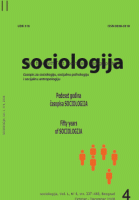Prava i obaveze kćeri-postadolescentkinja: Viđenja kćeri i roditelja
The Rights and Duties of Post-adolescent Daughters: Daughters’ and Parents’ Accounts
Author(s): Metka KuharSubject(s): Social Sciences
Published by: Sociološko naučno društvo Srbije
Keywords: post-adolescence; family relations; family rights and duties; Slovenia;
Summary/Abstract: The article deals with the conceptualisation and negotiation of post-adolescent daughters’ rights and duties in their families of origin. More and more young Europeans and particularly many young Slovenians are staying with their parents in the post-adolescence period (and even later) or come home from their university city every weekend. This means that two adult generations live together in the same household; so they have to negotiate the rights and duties of the younger generation in different areas, from very personal domains (e.g. appearance) to more far-reaching life decisions (e.g. the post-study life situation, moving out of the parental home). The study provides at least a partial insight into the processes involved in the negotiation of rights and duties in families with post-adolescent daughters. The data stem from semi-structured interviews conducted in autumn 2006 in Slovenia with 70 first-born post-adolescent girls and both of their biological parents. The respondents answered closed- and open-ended questions referring to four vignettes suggesting controversial situations. The answers allow a view of the conceptualisations of post-adolescents’ rights and duties, the distribution of decision-making power and the way of dealing with such situations. The results show that post-adolescent daughters are very dependent on their parents in various areas. It turned out that the contemporary Slovenian family with post-adolescent daughters is prepared to negotiate: patterns of intrafamilial communication range from the traditionally grounded commanding pattern where children have to obey unequivocally (but less than 10% of parents resort to the bare use of authority), to an open, active negotiation pattern where the balance of power is more equal and the achievement of consensus is very important.
Journal: Sociologija
- Issue Year: 50/2008
- Issue No: 4
- Page Range: 391-416
- Page Count: 26
- Language: English

